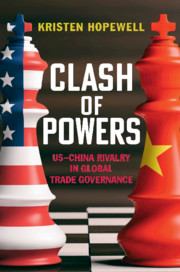Book contents
- Clash of Powers
- Clash of Powers
- Copyright page
- Contents
- Figures
- Tables
- Acknowledgments
- Introduction
- 1 The Doha Round Impasse
- 2 The New Politics of Agricultural Subsidies: A US–China Battle
- 3 The Dragon in the World’s Oceans: Fisheries Subsidies
- 4 Beyond the WTO: Erosion of the Export Credit Arrangement
- 5 Negotiating in the Dragon’s Shadow: Export Credit for Coal Plants
- Conclusion
- Notes
- References
- Index
5 - Negotiating in the Dragon’s Shadow: Export Credit for Coal Plants
Published online by Cambridge University Press: 21 January 2021
- Clash of Powers
- Clash of Powers
- Copyright page
- Contents
- Figures
- Tables
- Acknowledgments
- Introduction
- 1 The Doha Round Impasse
- 2 The New Politics of Agricultural Subsidies: A US–China Battle
- 3 The Dragon in the World’s Oceans: Fisheries Subsidies
- 4 Beyond the WTO: Erosion of the Export Credit Arrangement
- 5 Negotiating in the Dragon’s Shadow: Export Credit for Coal Plants
- Conclusion
- Notes
- References
- Index
Summary
This chapter examines efforts to establish new global rules to restrict export subsidies for coal-fired power plants, which are highly polluting and a major contributor to climate change. Government-backed export credit for coal power plants acts as a form of export subsidy, and thus promotes the expansion of such plants abroad. The US spearheaded multilateral negotiations within the context of the OECD Arrangement to prohibit the use of export credit for coal power plants. However, since China is not part of the Arrangement, it was not a participant in the negotiations or bound by the new disciplines created. China’s absence, I argue, weighed heavily over the negotiations and undermined efforts to construct an ambitious agreement. OECD exporters were extremely resistant to agree to restrict their use of export credit when China—the world’s largest supplier of export credit for overseas coal plants, accounting for nearly half of all export credit in this sector—would face no similar restraints on supporting its exports. Without China’s participation, the impact of the resulting agreement is severely limited. This case thus highlights the difficulty of building effective global trade rules today without the participation of China.
Keywords
- Type
- Chapter
- Information
- Clash of PowersUS-China Rivalry in Global Trade Governance, pp. 161 - 190Publisher: Cambridge University PressPrint publication year: 2020

